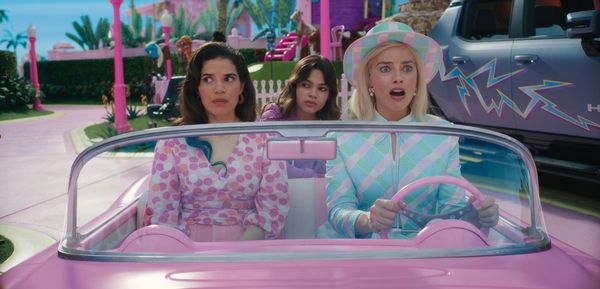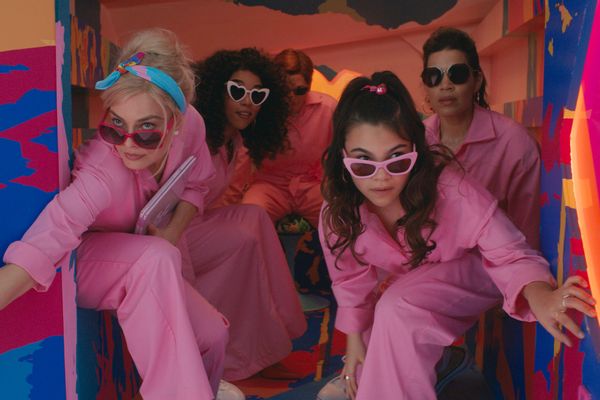
“Always stand out and always be grateful. But never forget that the system is rigged.”
That famous line from America Ferrera’s show-stopping “Barbie” speech about the impossibility of being a woman may be the easiest to quote from memory on any Tuesday.
On the morning that the 2024 Oscar nominations were announced, though, the line hit differently – that one, and the observation about having to always be extraordinary, but somehow always doing it wrong. Could that apply to Oscar voters? They were the ones who left top star Margot Robbie out of the best actress race while nominating Ryan Gosling’s performance as Ken.
Judging by the post-announcement murmurings, the more shocking snub was the choice to leave Greta Gerwig out of the best director competition while making “Killers of the Flower Moon's" Martin Scorsese the most nominated living director in Oscars history.
If Academy of Motion Picture Arts and Sciences voters wanted to prove that Gerwig was on to something by making patriarchy the main villain in “Barbie,” then well done.
However, we come not to entirely bury Oscar in beach sand but praise the Academy for giving the most important performance of the movie its due: Ferrera’s supporting actress nomination, a well-deserved acknowledgement after being passed over by the Golden Globes.
This Oscar nomination, Ferrera’s first, places her among eight Latinas recognized in the category’s history, out of which two actors, Rita Moreno (1961’s “West Side Story”) and her 2021 "West Side Story" costar Ariana DeBose have won a statue.
As Gloria, an administrative assistant to the all-male top brass at Mattel, Ferrera represents all the Barbie girls who matured into a world constantly hitting them with the message that, contrary to what the doll promised, women cannot do or be anything.

Patriarchy put the other guy in the White House, a philandering racist and sexist who tried to overturn the legitimized results of the 2020 direction has also been deemed a rapist by a civil jury in a lawsuit brought against him by journalist E. Jean Carroll.
That man loaded the Supreme Court with nominees who overturned Roe v. Wade and are set to open the floodgates to massive, well-funded deregulation efforts that stand to deliver flurries of body blows to vital independent agencies including the National Labor Relations Board (NLRB), the Securities and Exchange Commission (SEC) and the Environmental Protection Agency (EPA). And he doesn't even beach or love horses!
Gloria, meanwhile, is a normal woman doing her best to get by in such a place – a boring mom with a boring job “and a daughter who hates me!” – as she tells her unappreciative teen Sasha (Ariana Greenblatt). Gloria lives in a city where the air is notoriously polluted and in a country hostile to people who look like her, especially women. Why wouldn’t she pass the time by drawing Irrepressible Thoughts of Death Barbie, Full-Body Cellulite Barbie and Crippling Shame Barbie? Life has already awakened her to the realization that her house would not include a slide with a pool.
Grown women watching “Barbie” can relate more closely to Gloria than Robbie’s Barbie because of that monologue. The fact that it's delivered at the literal lowest point for the living doll, after Barbie has collapsed and refuses get up again, believing Barbie Land to be utterly lost to a patriarchal coup, bedazzles its poignance.
It also makes up two minutes and 20 seconds of a nearly two-hour movie – a triumphant peak in a performance throughout which Ferrera’s Gloria legitimizes Barbie as a power fantasy. Alec Baldwin won awards attention for his diatribe in 1992’s “Glengarry Glen Ross,” which amounted to around seven minutes of meaningful screentime. Ferrera visibility in “Barbie” outstrips that by quite a bit, consistently building to that moment as Barbie’s friend and teacher.
But as she lists all the ways that being a woman in impossible, Gloria isn’t acting the part of Barbie’s gushing hype-squad, as the rest of the Barbies were before being brainwashed to serve Kens. She's simply speaking as an overworked mother with a kid who doesn’t have time for others’ self-pity but, through meeting her childhood hero, maintains the hope that life can be better for her and her daughter.
She’s talking to Barbie, but she’s also addressing everyone figuring out a way back from the pandemic’s “every person for themselves, by themselves” mentality. And she reaches a conclusion that doesn’t wrap it all up in a bow by pointing to a way out or assuring us that it’ll get better. It simply conveys an understanding along with reminding the listener that we have to keep going.
“I'm just so tired of watching myself and every single other woman tie herself into knots so that people will like us,” Gloria says. “And if all of that is also true for a doll just representing women, then . . . I don't even know.”
At least Oscar recognizes the soliloquy’s significance along with honoring that its substantive power is rooted in Gerwig’s writing, which Ferrera helped her craft. Consequently, Gerwig and her partner Noah Baumbach received an Oscar nod for best adapted screenplay, which is among the eight nominations “Barbie” earned. That includes best picture, for which Robbie is nominated as a producer.
Even so, the best director category has five slots and included “Anatomy of a Fall” filmmaker Justine Triet alongside Christopher Nolan, favored to win for “Oppenheimer.” Arguments are already breaking out in defense of Jonathan Glazer’s directing work on “The Zone of Interest” of being worthy of notice. Many more moviegoers noticed Gerwig’s work, not to mention the fact that this category has been male dominated since . . . forever.

“Barbie,” whose global box office gross sits at just under $1.45 billion. One can’t accuse the marketplace of failing to notice the movie's creative achievement. If Oscar must deny its director and star their due in their respective individual categories, that only further validates what Gloria was saying about all the rules being too contradictory – “and nobody gives you a medal or says thank you!” – but we get it. And maybe that knowing is enough to keep our chin up for Ferrera’s prospects on Oscar night.
The 96th Academy Awards will be broadcast live on Sunday, March 10 on ABC.
[CORRECTION: A previous version of this story had erroneously stated Alec Baldwin won an Oscar for his role in "Glengarry Glen Ross," and conflated Lupita Nyong'o's nationality with her ethnicity.]







